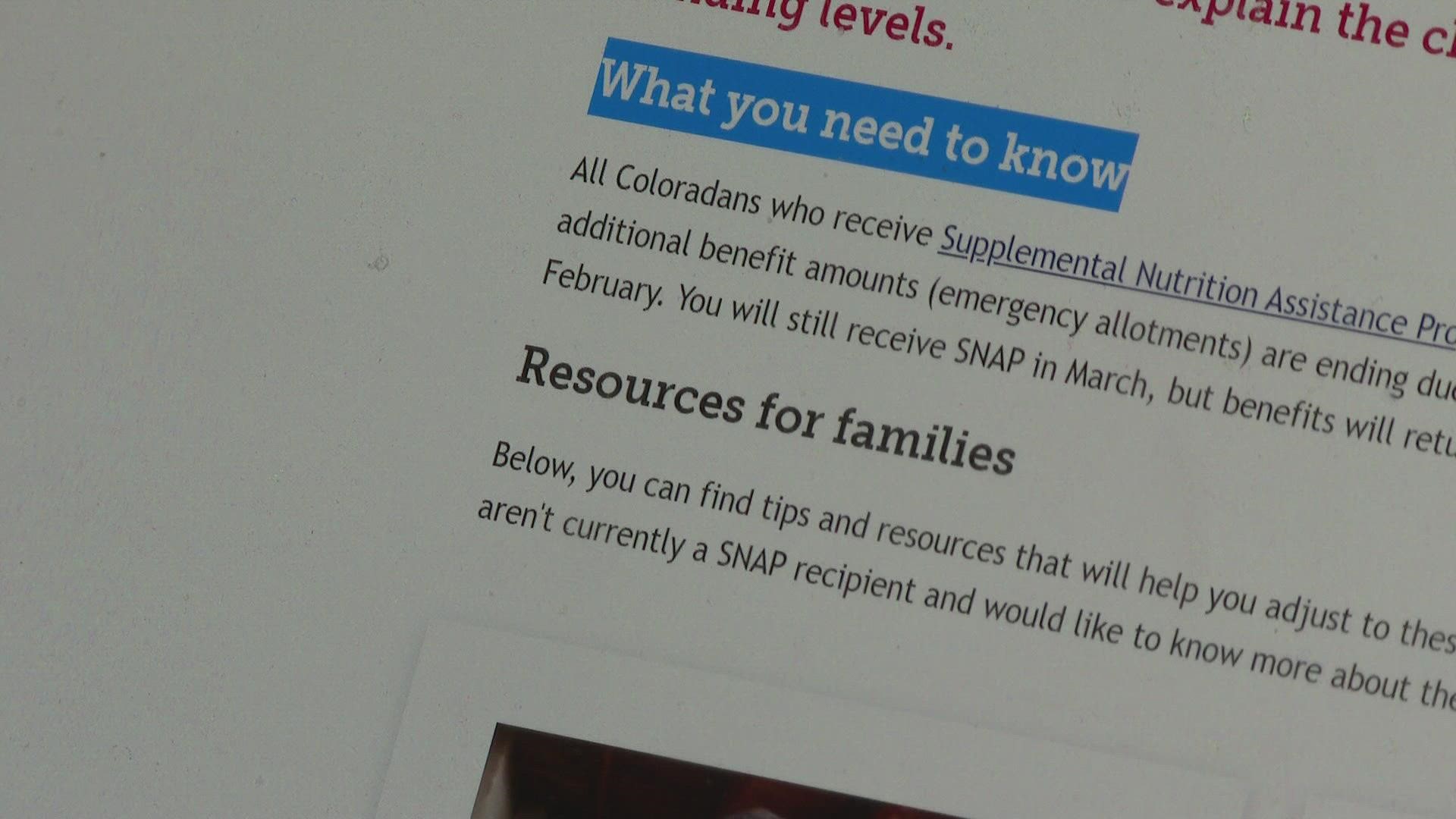DENVER — Hundreds of thousands of Coloradans will see a big cut to their food stamps in the next couple of months.
The temporary boost to the Supplemental Nutrition Assistance Program (SNAP) put in place during the pandemic is set to expire at the end of February due to a new federal law.
Karla Maraccini, director of the Department of Food and Energy Assistance for the Colorado Department of Human Services, spoke with 9NEWS about the impact that the decrease in benefits will have on Coloradans.
How many people will the decrease in SNAP benefits impact?
Maraccini: About 554,000 people will experience a reduction in their benefits.
Can individuals appeal these cuts?
Maraccini: It is not an appealable change, so this change is a result from the Omnibus bill or the Consolidated Appropriations Act and so it has delinked the temporary extended SNAP benefit from the public health emergency.
For the three years of the pandemic, we’ve been issuing this extra benefit called emergency allotment or maximum allotment. It brings up all households to the maximum amount for their household size.
If they were already at that maximum amount allowable, then it brought them up an additional $95. Since this is considered a mass change and it's nationwide, this is not appealable. This is not a decision the county office of human services or the state office of human service can reverse.
How big of a cut is this?
Maraccini: There are about 289,000 households in Colorado that participate in SNAP, in that is the 554,000 people roughly, and on average this will be about a $90 per person, per household reduction. A family of four for instance is probably going to see a decrease of $360 beginning in March.
Statewide, it will be about $55 million per month, so I’ll give you an example. In the month of January, we issued roughly $158 million in SNAP benefits of which $55 million was attributed to the SNAP max allotment. So it’s about 34% overall, which is not only a devastating impact for households who participate in SNAP but it’s going to be a big hit in the Colorado economy that supports local grocers, retailers and farmers, producers, ranchers.
What should people do to prepare going forward?
Maraccini: We do have some tips on our website about how to stretch your food budget even farther, opportunities to really look at what other program you may be eligible for.
If folks have not looked at their PEAK account lately, and PEAK is the Program Eligibility and Application Kit that’s online for Colorado, they should log into PEAK and just see if there are other programs they may be eligible and could start participating in, such as the temporary assistance for needy families, which is known as Colorado Works here. If it is a family with very young children, they may be eligible to participate with WIC
Outside of those particular programs, it’s possible people can get additional assistance at a local food bank or food pantry. The emergency food assistance program and commodity supplemental for seniors program, which in Colorado is known as Everyday Eats, are programs that most food banks and pantries are able to provide supplemental boxes every month for participants.
What is your message to these families impacted by this?
Maraccini: People are nervous and scared, and understandably this is going to be a really difficult change for a lot of families, especially coming at a time when food prices have been at the highest that they’ve been in many, many years. Some studies show that it’s at least 12% higher this year than it was last year.
We are getting a lot of calls about this, and unfortunately this is not appealable. We cannot reverse this decision. It was decision made by Congress.
I think there is a lot of confusion about when this change is going to take place. Households will get their final emergency benefit in the month of February, and then in March, they will only receive their calculated benefits based on their individual circumstances, their income their expenses and that kind of thing.
SUGGESTED VIDEOS: Latest from 9NEWS

